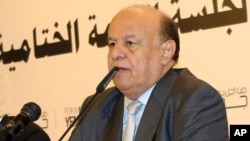Senior U.S. security officials said Friday that U.S. counterterrorism operations had been suspended in Yemen, following the collapse of the U.S.-backed government.
Sources close to the situation said the resignations of Yemeni President Abd Rabbuh Mansour Hadi and the government of Prime Minister Khaled Bahah had left U.S. anti-terror operations in the country "paralyzed."
The Reuters news agency quoted three U.S. officials as saying the halt in operations included drone strikes. It remained unclear late Friday how long the suspension would be in place.
U.S. forces work alongside Yemeni security personnel in monitoring al-Qaida in the Arabian Peninsula, or AQAP, from a key intelligence post in southern Yemen. But officials late Friday said much of that intelligence operation was now controlled by Shiite rebels, known as Houthis, who seized key government installations Thursday and forced out the government.
Houthi rebels are opposed to AQAP, as well as the United States. The al-Qaida group has been behind several terrorist plots, including the recent attack on a French satirical magazine that left 12 dead.
Earlier Friday, U.S. officials had maintained that despite the rebel siege in Yemen's capital and uncertainty swirling around the country's leaders, the United States continued to have a military presence in the country.
"There is a footprint of U.S. military personnel in there that has been dedicated to counterterrorism operations. They are still there,” Pentagon press secretary Rear Admiral John Kirby said.
Kirby added that the chaos would not stop Washington’s counterterrorism fight. “We’ve also proven the ability to go after terrorists in various places around the world unilaterally, and we will still retain that right, that responsibility, and we will still make sure we have the resources to do that,” he said.
However, one U.S. counterterrorism official, speaking on condition of anonymity, noted that Washington’s operations in Yemen had been heavily dependent on Hadi.
“The success we’ve been able to have against al-Qaida in the Arabian Peninsula was due in large part to Hadi’s willingness to cooperate,” the official told VOA.
The Houthi rebels' opposition to AQAP could play in Washington’s favor, said Barbara Bodine, a former U.S. ambassador to Yemen and the current director of Georgetown University’s Institute for the Study of Diplomacy.
“Ironically, whatever else is on that agenda of theirs, and how they play into the political process, the Houthis in their own way would be an ally with the United States, if both sides choose to deal with each other,” Bodine said.
The rebels took over the capital earlier in the week and surrounded Hadi in his residence, but they stopped short of declaring a coup. Yemen’s parliament is to decide Sunday whether to accept Hadi’s resignation.
What political agenda the Houthis will pursue is not yet clear.
The result, said State Department spokeswoman Jen Psaki, is “tensions, and a great deal of violence on the ground. It’s an incredibly fluid situation and we are watching very closely.”
VOA's Sharon Behn, Jeff Seldin and William Gallo contributed to this report. Some information for this report came from Reuters.











